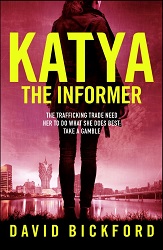You have no items in your cart. Want to get some nice things?
Go shopping
It’s 1972. The Maiden sea tower stands 15 miles from shore, shining her light for seafarers. Last night she was manned by three keepers, but this morning …. she’s empty. There’s no sign of disturbance, the doors are locked from the inside and both clocks stopped at 8.45am. The men have vanished.
Hooked yet? I was. The Lamplighters begins with a classic locked room mystery, inspired by a real-life event in the Outer Hebrides in 1900, but the mystery is just the starting point for this ambitious novel. 20 years on, it’s 1992 and the men still haven’t been found. Author Dan Sharp decides it’s time to unlock The Maiden’s secrets. “Someone out there knows more than we realise,” he tells a newspaper and embarks on an investigation that centres on interviews with the three women that the Keepers left behind.
Sharp meets with Helen, Jenny and Michelle several times and in the book’s 1992 sections we are provided with transcripts of their words, accompanied by a more conventionally written chapter that provides insight into each woman’s life. We also go back to 1972, to the days leading up to the disappearance, and hear directly from the missing men, as if Sharp is showing us their secret journals.
This structure allow us get to know each character directly. Each monologue displays their biases and insecurities. Their accounts often conflict. Jenny tells us she and Bill have a happy marriage – so why does he spend so much time at sea? Bill thinks that Vince, the youngest member of the team, is crude and shallow – but Arthur tells us Vince writes poetry and Vince’s girlfriend Michelle still thinks of him as her only love 20 years on. And why do Helen and Arthur so seem so estranged when they appear to love each other? Each chapter reveals a little more and offers up another mystery. It feels like the lapping of an outgoing tide, coming forward to leave a new clue, retreating to show more of the beach.
The sea, as you might expect, dominates the novel. Vivid descriptions of its shifting moods create the prevailing atmosphere of the book. The characters love the sea, or hate it, but they are never indifferent and they are all drawn to it. The Maiden, too, is an imposing presence. She ‘looms palely magnificent against the horizon’. Visible from the Keeper’s cottages on shore, she is at times a Siren calling the Keepers back, at others an ominous warning to keep away. She has a mythic quality, The Maiden, built, as legend has it, ‘on the jaws of fossilised sea monsters’ and she knows how to keep her secrets.
The atmosphere that Stonex so cleverly creates is why The Lamplighters reads as more than a mystery novel. The Maiden exists in that liminal spot between land and sea, and the novel exists in a similar space where the worlds of the natural and supernatural dissolve into each other. Bill tells us, “there are keepers who stay so long on the towers they start to hear mermaids.” Do the keepers, driven mad through solitude, imagine the mermaids? Or are their senses sharpened so they can hear better than we can? Helen believes the men’s disappearance is a terrible accident covered up by their employers, Trident. Jenny suspects a strange supernatural event. Who is right? How can we know? The book does not exclude any version of events but treads the line between them with, for the most part, the lightest of footfalls. Seabirds appear like omens, there’s a Silver Man who could be a drug-dealer but is reported to occupy two places at once. Always we have a sense that if you turn around fast enough you might catch sight of … something … out of the corner of your eye.
The novel is most satisfying when we are allowed to draw our own conclusions, to live with the tension resulting from the ambiguity that saturates the novel. There are points when, for me, the mystical elements seem too substantial (I didn’t feel we needed the Silver Man, for example) but for the most part we feel the sands could shift at any time and we need to read on to see what happens next because, in the world of this book, it could be anything.
The Lamplighters is hard to put down, not only because I wanted to know what happens but because there’s a richness to the language that borders on the poetic, no detail too small not to be lovingly crafted. In the empty lighthouse the investigators find, “the table laid for a meal unseen … two empty cups. Salt and Pepper. A Tube of mustard and an ashtray, cleaned.” This extraordinary level of care and attention, both in detail and word choice, is sustained throughout the novel. The world of the Keepers, and their living conditions inside the sea tower, is particularly detailed – it’s a fascinating insight into a profession with which most of us are unfamiliar.
Similar care is evident in the creation of the characters. Helen is central to Sharp’s investigation. She is still alone after 20 years, neither Arthur’s wife or yet his widow, and she is struggling to move on. Although Helen is the one who tells Sharp there must be a rational reason for the men’s disappearance, she’s also the person most haunted by the past. At the outset of the story, “the ghouls continued to slip between her clothes in the wardrobe, making her shiver when she got dressed in the mornings,” an example of the kind of beautiful phrasing that permeates the book and makes it a treat to read. Jenny has her children, and Michelle a whole new family, but Helen only has her memories – and they won’t let her rest.
It’s the descriptions, the language, that I think I will remember most about this novel, that and the eerie evocation of a liminal world where we are poised, characters and readers alike, on the cusp of knowing and of not-knowing, of knowing and of not-wanting-to-know. As a mystery it kept me engaged, though I felt that the ‘aha’ moments didn’t always live up to expectation. We find out the true identity of Dan Sharp, for example, right at the end, but I’m not sure it was worth the wait, given keeping him out of the narrative until that point forces some artificiality into the transcripts that grated a little.
Having said that, I did enjoy his last-minute destruction of his manuscript. “You write the ending,” he tells Helen, releasing her from her old story. It’s a neat device, leaving us to wonder which parts of the book Dan wrote and which, therefore, may be fictions within the fiction. How can we ever know the truth of events on the sea tower? Of course, Dan is himself a fiction, as is the novel … a satisfying circularity that leads us back to our own world, holding the book in our hands, wondering what might have happened on the real lighthouse in the Outer Hebrides, all those years ago.
Jackie Morris





